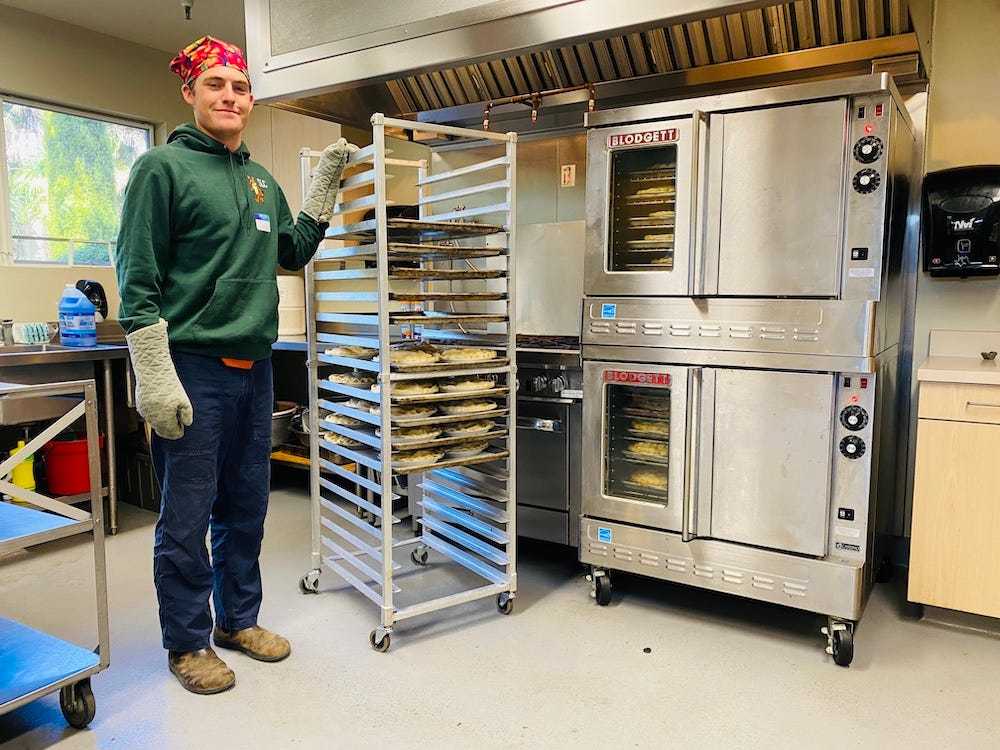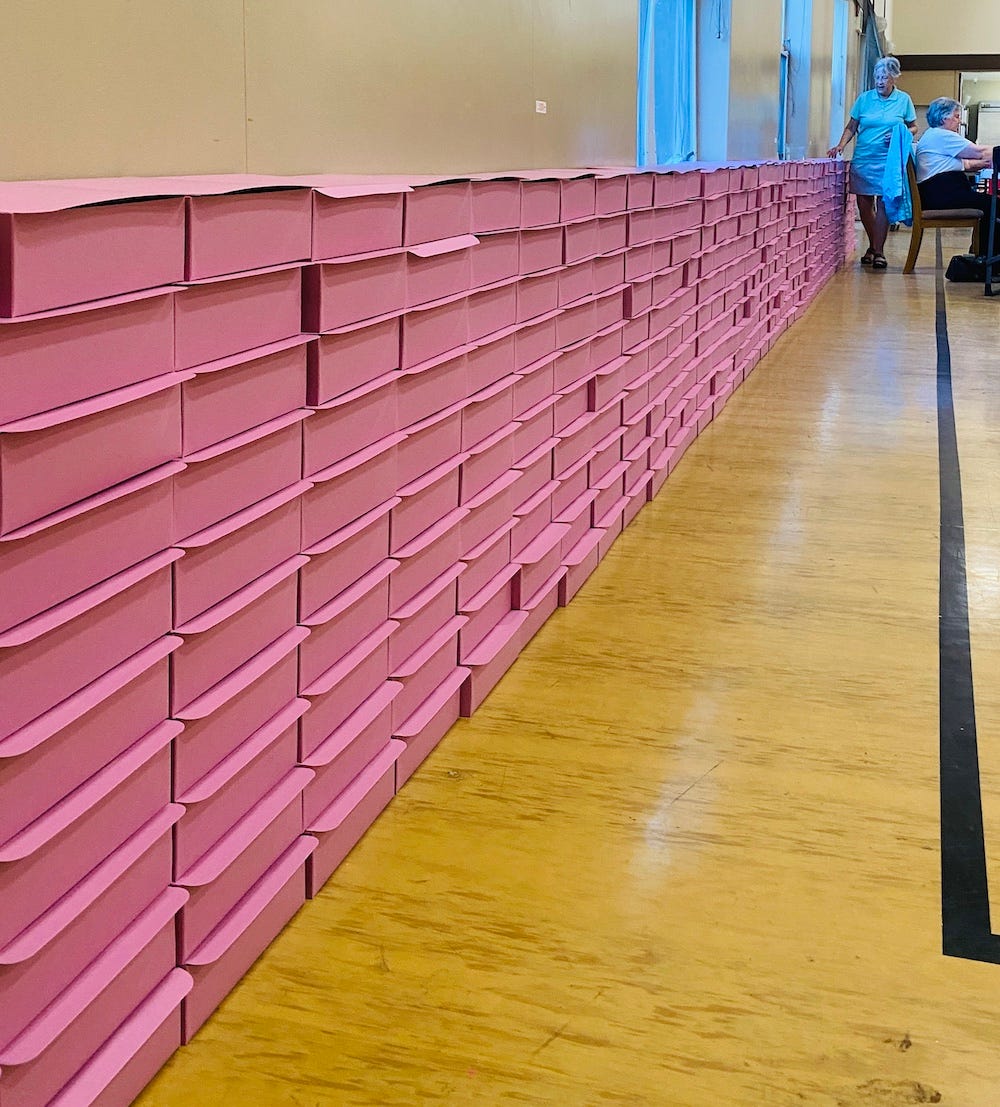What's it like making 1,000 apple pies?
Ask the volunteers at the Community Church of Sebastopol, who are having their annual apple pie drive-thru fundraiser this weekend

Apple-pie season is upon us, and the proof is definitely found under the crust. A volunteer crew is in full swing at Community Church of Sebastopol, working multiple shifts to pump out pies in anticipation of this weekend’s yearly drive-thru fundraiser sales event. Pie sales, in fact, began Friday at 8 a.m., and continue Saturday and Sunday, August 10 and 11, from 10 a.m. to 6 p.m. each day, or until pies run out.
“We started the apple-pie-making 52 years ago,” said Kathy Matthies, apple pie event co-chair, who has been associated with the church for 38 years and the pie fundraiser for 14. “We just sold them on the street, you know?” A year or two later, the church began selling them at the annual Gravenstein Apple Fair.
That tradition continued for almost 50 years, ending two years ago due to COVID and a subsequent decrease in volunteers, which resulted in the acquisition of two new labor-saving machines. During that time, the church realized that keeping the pie sale in-house saved time and lowered overhead costs.
“So we opted not to do the fair anymore, but we still keep it a community event,” Matthies said.
The community she refers to includes the church community and dozens of its members of all ages who work volunteer shifts for the fundraiser, as well as pie-purchasing residents of Sebastopol proper and attendees of the Gravenstein Apple Fair, held a few short blocks away.
This year’s pie-making process began with the procurement of two half-bins of apples from Dutton Ranch. No one seemed to know how many pounds that equaled, but everyone agreed it was a lot. A two-person team of volunteers—Denelle Tognozzi and Paula Berndt—processed the apples with one of the church’s two new state-of-the-art machines, which, according to Tognozzi, “peels, cores and slices six apples at a time.” Then, volunteers cleaned the apple pieces, while in another room dough production took place, resulting in crust-lined aluminum pie-pans.
On Friday morning, volunteer Anna Katrina began the actual pie-assembly process by putting apple pieces in a pie crust. Other volunteers down the line added sugar and cinnamon, or put the tops on and crimped the edges, before someone carted the pies en masse to the commercial kitchen in Memorial Hall for baking.
In the commercial kitchen, brothers Aaron, Jonah and Henry Knuth ran the oven. The second of the church’s new labor-saving machines, a Blodgett double-capacity convection oven, bakes 50 pies at a time, in 40 minutes, for a daily production of 500 pies in about 7 hours.

Volunteers typically work 4-hour shifts, split across Thursday setup, Friday and Saturday baking, and Sunday clean-up, with the goal of producing a total of 1,000 pies by Saturday afternoon. The Knuth crew worked like a well-oiled machine, baking 100 pies by 9:30 a.m.—or, in their first 90 minutes.

While pies originally sold for $5 each decades ago when the project first started, they now sell for an even $20 a pop. The money raised helps fund several church programs.
“A lot of the proceeds go to ‘camperships’ [camp scholarships] to support youth programs,” Matthies said. “This summer the apple pies enabled a group of our teenagers to go to Tijuana and help build a house with another organization.”
The money also helps fund a team of adults that annually embarks on a mission to aid in disaster recovery.
“We send between 12 and 19 people,” Matthies said. “Our first trip was to Katrina, in 2005.” But California has proven so calamity-prone for the past decade that the adult volunteers no longer leave the state, assisting instead in the aftermath of regional fires and other disasters.
The pie-selling process ends, of course, with the most fun part—selling them. Enter Bobbie Johanson, who arrived at Memorial Hall at 8 a.m. Friday morning, put the signs out front at 8:30 a.m. and began selling pies at 10 a.m. She’s helped with the pies for 41 years. She sat at a pie-laden table with a young helper, the two of them running pies out to the cars that pulled up outside.
Johanson’s favorite part of the whole endeavor?
“We call it a fundraiser, but it’s a ‘fun-raiser,’” she said. “It builds community of all ages in the church. And as the kids grow up, they can do different jobs, you know? It’s just really fun for them.” She gestured at some extra pie-sale signs stacked a few feet away. “[And] if we have teenagers with nothing to do, they can go out front and do the dance thing, you know?”
She smiled, adding: “I don’t know any other church that does this. We have our identity in place.”



